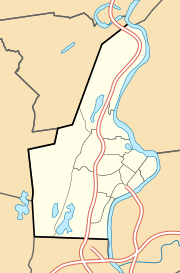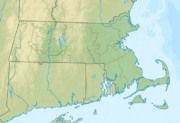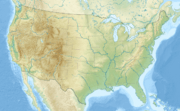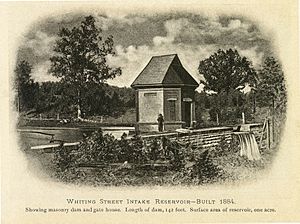Whiting Street Reservoir facts for kids
Quick facts for kids Whiting Street Reservoir |
|
|---|---|
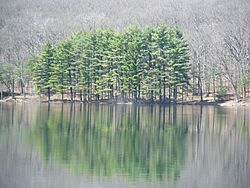
Pine stand on the shores of Whiting Reservoir
|
|
|
Location in the United States
|
|
| Official name | Whiting Street Reservoir |
| Country | United States of America |
| Location | Holyoke, Massachusetts |
| Coordinates | 42°14′29″N 72°38′10″W / 42.241509°N 72.636026°W |
| Purpose | Drinking water supply |
| Status | Operational |
| Opening date | 1888 |
| Owner(s) | City of Holyoke |
| Operator(s) | Holyoke Water Works |
| Reservoir | |
| Total capacity | 479 million gallons |
| Catchment area | 897 acres |
| Surface area | 114 acres |
| Maximum length | 6280 feet |
| Website http://www.holyoke.org/departments/water-works/ |
|
Whiting Street Reservoir, often called Whiting Reservoir, is a very important water source for the city of Holyoke, Massachusetts. It holds a lot of water – over 479 million gallons! This reservoir helps make sure people in Holyoke have clean drinking water. It can provide about 1.5 million gallons of water every day.
Contents
About Whiting Street Reservoir
The Whiting Street Reservoir is a key part of Holyoke's water system. It is considered a Class I hazard reservoir. This means it is very important for safety and needs careful management. The reservoir serves as an extra supply of drinking water for the city.
How the Reservoir Was Built
The construction of the reservoir finished in 1888. It became fully ready to use that same year. An access road was added around the reservoir in 1897.
Workers built the reservoir by creating a dam across a stream called Raging Brook. They used sandstone and earth to build the dam. This was the first time the Holyoke Water Works created a water source by building a dam.
Protecting Our Water
To keep the water clean and safe, there are special rules at the reservoir. Fishing is not allowed here. This rule helps stop harmful plants or animals, called aquatic invasive species, from getting into the water. These species could hurt the water quality.
In the 1980s, new rules for cleaning water came out. Because of these rules, the reservoir was put on standby in the early 1990s. This means it is ready to be used if needed, but it is not the main water source all the time.
Rules for Visitors
Many rules help keep the reservoir's water pure. For example, dogs are not allowed on the property. You also cannot ride horses, camp, or smoke there. Sledding and riding motorcycles are also not allowed. These rules protect the water and the land around it.
The Rudy Lengieza Cross Country Course
In 2018, the trail and road around the reservoir got a new name. It is now called the Rudy Lengieza Cross Country Course. Rudy Lengieza was a coach at Holyoke Catholic High School. He coached boys' and girls' cross-country teams for over 50 years. This new name honors his long service.
 | Sharif Bey |
 | Hale Woodruff |
 | Richmond Barthé |
 | Purvis Young |


